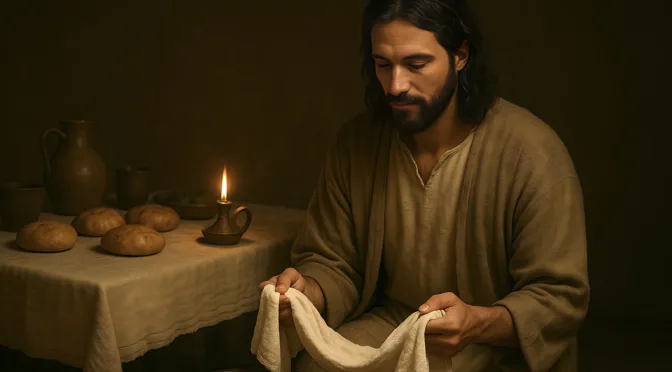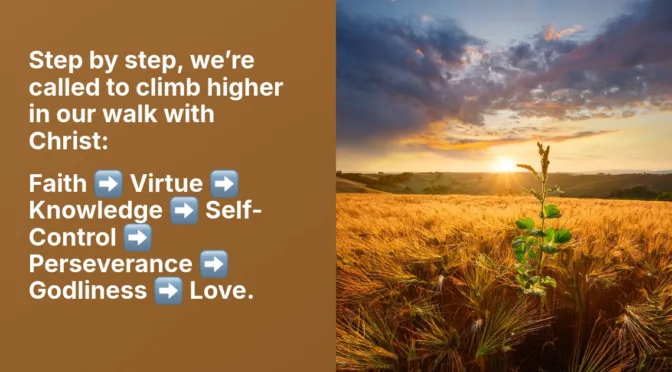As believers, one of the greatest gifts we experience is the revelation that unfolds as we journey in God’s presence. Walking with God is not about instant understanding but about trusting Him to reveal Himself step by step. The Gospel of Mark beautifully illustrates this through the life and ministry of Jesus, demonstrating how revelation unfolds when we choose to follow Him.
The Call to Follow: Beginning the Journey of Revelation
When we first hear God’s call, it often comes simply yet profoundly. In Mark 1:17 (AMP), Jesus says to Simon and Andrew, “Come follow Me, as My disciples, and I will make you fishers of men.” This invitation marks the beginning of a transformative journey—a journey where revelation unfolds as we walk in His presence.
Imagine these men, ordinary fishermen, going about their daily tasks, unaware that their lives were about to change forever. Jesus didn’t provide a detailed map or a guaranteed future. He simply called them to follow Him. Their understanding of who He was and what He had in store would unfold as they journeyed with Him.
This mirrors how God often works in our lives. He calls us without giving us the full picture, requiring us to step out in faith. The path may be uncertain, but Jesus’ presence is our constant. As we respond to His call, we embark on a journey where God reveals Himself in ways we could never imagine.
Trusting His Call Without All the Details
In a world that craves certainty, stepping into the unknown can be daunting. Yet, the call to follow Jesus is a call to walk by faith, not by sight (2 Corinthians 5:7 AMP). Like the disciples who left their nets behind, we may need to let go of what’s familiar to embrace God’s plans.
Jesus doesn’t promise an easy road filled with worldly success. What He promises is Himself. As we follow Him, we come to know Him more deeply, and our lives are transformed. This is His promise to us today. The journey may be uncertain, but the One who calls us is faithful.
Revelation in the Journey
As the disciples walked with Jesus, their understanding deepened gradually. Each miracle witnessed, each parable heard, each moment in His presence added a piece to the puzzle of who He is. Similarly, God reveals Himself to us as we walk with Him, often in ways that are subtle yet profound.
Consider Abraham’s response to God’s call in Genesis 12:1 (AMP). Without knowing where he was going, Abraham trusted God. His faith wasn’t rooted in knowing the details but in trusting God’s faithfulness. This principle applies to us. As we walk in His presence, we begin to see His hand at work, guiding and shaping our lives.
Leaving Behind to Follow
Simon and Andrew left more than nets; they left their old way of life. Following Jesus meant embracing a new identity shaped by His revelations. This is the heart of discipleship—letting go of the old to step into the new.
Jesus’ call is also a call to purpose. He promises to make them “fishers of men.” Following Him is active and transformative. As we follow, He shapes and equips us for the purpose He has for us. This revelation of purpose unfolds as we journey with Him.
In our lives, following Jesus may require us to leave behind comfort, security, or personal plans. But what we gain—a deeper relationship with God and a clearer sense of purpose—is far greater. We can trust that He will reveal what we need to know at just the right time.
The Invitation to Follow Today
Jesus’ call extends to us all. Each day, He invites us into a journey of revelation. How will we respond? Will we leave behind what’s familiar to follow Him into the unknown? In His presence, the journey becomes the revelation. The more we walk with Him, the more we understand His heart and His plans for us.
Supporting Scriptures:
- “Trust in the Lord with all your heart and lean not on your own understanding.” — Proverbs 3:5 (AMP)
- “You did not choose Me, but I chose you and appointed you that you should go and bear fruit.” — John 15:16 (AMP)
- “For we walk by faith, not by sight [living our lives in a manner consistent with our confident belief in God’s promises].” — 2 Corinthians 5:7 (AMP)
Revelation Through Miracles: Experiencing God’s Power on the Journey
As we journey with God, He often reveals Himself through miracles—powerful displays of His authority and compassion. In the Gospel of Mark, Jesus performs numerous miracles, each offering a glimpse into His divine nature and His heart for humanity.
In Mark 2:10-12 (AMP), Jesus heals a paralytic man, saying, “But so that you may know that the Son of Man has authority and power on earth to forgive sins.” The physical healing was astonishing, but the greater revelation was Jesus’ authority to forgive sins—a declaration of His divinity.
Miracles as Moments of Revelation
Every miracle Jesus performed was more than an act of compassion; it was a revelation of God’s character. When He calmed the storm (Mark 4:39-41 AMP), the disciples were left in awe, questioning, “Who then is this, that even the wind and the sea obey Him?” They witnessed His dominion over nature, deepening their understanding of who He is.
In our lives, miracles—big or small—serve the same purpose. They are invitations to know God more deeply. Whether it’s a healing, a provision, or an answered prayer, each miracle reveals His presence and power in our lives.
Walking in Expectation of God’s Power
Jesus encourages us to walk in faith, expecting God’s power to work in our lives. In Mark 9:23 (AMP), He says, “All things are possible for the one who believes and trusts [in Me]!” Miracles are not just historical events; they are ongoing expressions of God’s love and power for those who believe.
While miracles can be extraordinary, they often occur in the everyday moments—peace in chaos, strength in weakness, hope in despair. God is continually revealing Himself to us, inviting us to trust Him more fully.
Recognizing the Purpose of Miracles
Miracles are not just demonstrations of power; they are expressions of God’s love and compassion. In Mark 1:41 (AMP), Jesus heals a leper, moved by compassion. Each miracle points us to God’s heart—a heart that desires relationship with us.
When Jesus healed the woman with the issue of blood (Mark 5:34 AMP), He addressed her as “Daughter,” restoring her identity and affirming her faith. Miracles often carry deeper revelations of God’s love and our identity in Him.
Miracles and Our Response
Experiencing God’s miracles calls for a response. In Mark 2:12 (AMP), after the paralytic was healed, the crowd glorified God, exclaiming, “We have never seen anything like this!” Miracles should lead us to worship, awe, and deeper faith.
They also challenge us to believe. The father seeking healing for his son cried out, “I do believe; help my unbelief” (Mark 9:24 AMP). God meets us where we are, inviting us to trust Him more.
The Invitation to Experience God’s Power
The same Jesus who performed miracles in the Bible is at work today. He invites us to walk with Him, expecting His power to be revealed in our lives. Each miracle is an opportunity to know Him more deeply.
Supporting Scriptures:
- “And these signs will accompany those who have believed: in My name they will cast out demons, they will speak in new tongues.” — Mark 16:17 (AMP)
- “Call to Me and I will answer you, and tell you [and even show you] great and mighty things.” — Jeremiah 33:3 (AMP)
- “For nothing will be impossible with God.” — Luke 1:37 (AMP)
The Gradual Unfolding of His Identity: Revelation in Every Step
Walking with Jesus is a journey of gradual revelation. In the Gospel of Mark, the disciples come to understand Jesus’ true identity step by step. This unfolding mirrors our own journey, as God reveals Himself to us over time.
In Mark 8:29 (AMP), Jesus asks, “But who do you say that I am?” Peter answers, “You are the Christ (the Messiah, the Anointed).” This confession marks a significant moment, yet the disciples’ understanding was still incomplete.
Revelation in Everyday Moments
The disciples’ revelations came not just in dramatic moments but in daily interactions—miracles, teachings, shared experiences. Each encounter added depth to their understanding of Jesus.
Similarly, God reveals Himself to us in our daily lives. Through scripture, prayer, and life’s circumstances, He shows us more of who He is. The feeding of the five thousand (Mark 6:41-44 AMP) revealed Jesus as the provider, teaching the disciples about His compassion and power.
Revelation Through Time and Trust
Revelation requires patience and trust. Even after Peter’s confession, he struggled to accept Jesus’ path to the cross (Mark 8:32-33 AMP). Yet, Jesus continued to guide him. Our understanding deepens as we remain faithful on the journey.
1 Corinthians 13:12 (AMP) reminds us that we now see dimly but will one day see clearly. God is faithful to reveal Himself as we seek Him.
Embracing the Mystery of God
We will never fully comprehend God, but this mystery invites us deeper into His love. Ephesians 3:18-19 (AMP) speaks of knowing the vastness of Christ’s love—a knowledge that surpasses understanding. Our journey is one of continual discovery.
Responding to Revelation
Each revelation of God invites a response—worship, obedience, deeper faith. After Jesus calmed the storm, the disciples were in awe (Mark 4:41 AMP). Our encounters with God should lead us to greater reverence and commitment.
The Invitation to Continue the Journey
God invites us to keep walking with Him, trusting that He will reveal Himself along the way. Every step taken in faith brings us closer to His heart.
Supporting Scriptures:
- “For now we see in a mirror, dimly, but then face to face.” — 1 Corinthians 13:12 (AMP)
- “Ask and keep on asking, and it will be given to you.” — Matthew 7:7 (AMP)
- “[I pray] that the God of our Lord Jesus Christ… may give you a spirit of wisdom and of revelation.” — Ephesians 1:17 (AMP)
The Mountaintop Experience of Revelation: Seeing His Glory
There are times when God reveals Himself in profound ways—mountaintop experiences that transform us. In Mark 9:2-3 (AMP), Jesus is transfigured before Peter, James, and John, revealing His divine glory.
The Invitation to the Mountain
Only three disciples witnessed the Transfiguration, highlighting that deeper revelations often come to those who seek Him earnestly. We, too, are invited to draw closer, to ascend the mountain through prayer, worship, and devotion.
Revelation of Glory and Identity
On the mountaintop, the disciples saw Jesus in His divine splendor and heard God’s voice affirming Him as His beloved Son (Mark 9:7 AMP). Such moments reveal not just what God can do but who He is.
Coming Down from the Mountain
After the Transfiguration, Jesus led the disciples back down to continue their mission. Mountaintop experiences equip us for the valleys, reminding us of God’s presence as we face life’s challenges.
The Lasting Impact of the Mountaintop
These profound encounters leave a lasting imprint on our faith. Peter later reflects on this experience in 2 Peter 1:16-18 (AMP). Our mountaintop moments anchor us in truth, providing strength and assurance in difficult times.
Supporting Scriptures:
- “Draw near to God, and He will draw near to you.” — James 4:8 (AMP)
- “Who may ascend onto the mountain of the Lord?” — Psalm 24:3-4 (AMP)
- “We ourselves heard this voice… when we were with Him on the holy mountain.” — 2 Peter 1:18 (AMP)
The Ultimate Revelation: The Cross
The cross is the pinnacle of God’s revelation to humanity. In Mark 10:45 (AMP), Jesus states, “For even the Son of Man did not come to be served, but to serve, and to give His life as a ransom for many.” At the cross, God’s love, justice, and mercy converge.
The Cross as the Fulfillment of Revelation
All of Jesus’ life pointed to the cross. Despite the disciples’ struggles to understand, the cross was God’s plan for redemption. It reveals the depth of His love and the extent He would go to restore us.
Romans 5:8 (AMP) declares, “But God shows and clearly proves His own love for us by the fact that while we were still sinners, Christ died for us.” The cross transforms us from enemies to children of God. It’s not just a historical event but the defining moment of our faith.
The Cross and the Love of God
John 3:16 (AMP) encapsulates this revelation: “For God so [greatly] loved and dearly prized the world, that He [even] gave His [One and] only begotten Son.” The cross demonstrates God’s immeasurable love.
The Cross: The Pinnacle of Revelation
At the cross, God’s justice and mercy meet. It’s the ultimate revelation of His character and His plan for salvation. Nothing can separate us from this love (Romans 8:38-39 AMP).
Supporting Scriptures:
- “He Himself bore our sins in His body on the cross.” — 1 Peter 2:24 (AMP)
- “For God so [greatly] loved and dearly prized the world…” — John 3:16 (AMP)
- “But God shows and clearly proves His own love for us…” — Romans 5:8 (AMP)
Walking the Road of Discipleship: The Journey Continues
In Mark 8:34 (AMP), Jesus calls us to “deny [ourselves], take up [our] cross, and follow Me.” Discipleship is a daily journey of surrender, obedience, and transformation.
The Cost of Discipleship
Following Jesus requires us to set aside our own desires and embrace His will. It’s a path of sacrifice but also of unparalleled joy and fulfillment.
Revelation Through Challenges
The road of discipleship includes trials, but these challenges deepen our faith. God reveals His faithfulness and strength in our weaknesses.
As we walk with Jesus, we’re transformed into His likeness. Every step is a step closer to His heart and His purposes for us.
Walking Daily in His Presence
Discipleship is not a one-time decision but a daily commitment. In His presence, we find the guidance and strength to continue.
Supporting Scriptures:
- “If anyone serves Me, he must follow Me.” — John 12:26 (AMP)
- “Your word is a lamp to my feet and a light to my path.” — Psalm 119:105 (AMP)
- “But whoever practices truth comes to the Light.” — John 3:21 (AMP)
Conclusion
The journey of revelation is a lifelong adventure. As we walk in God’s presence, He continually reveals Himself, drawing us deeper into His love and purpose. The Gospel of Mark invites us to step out in faith, to seek Him earnestly, and to embrace the transformation that comes from knowing Him.
Let us commit to this journey, trusting that God will guide us every step of the way. As Psalm 16:11 (AMP) proclaims, “You will show me the path of life; in Your presence is fullness of joy; at Your right hand there are pleasures forevermore.”
See Also:












